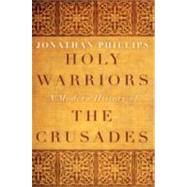
Note: Supplemental materials are not guaranteed with Rental or Used book purchases.
Purchase Benefits
What is included with this book?
| Illustrations and Maps | p. xi |
| Introduction | p. xvii |
| "Deus Vult!": The First Crusade and the Capture of Jerusalem, 1095-99 | p. 3 |
| "May God's Curse Be Upon Them!": Relations Between Muslims and Franks in the Levant, 1099-1187 | p. 29 |
| "A Woman of Unusual Wisdom and Discretion": Queen Melisende of Jerusalem | p. 51 |
| The "Blessed Generation": Saint Bernard of Clairvaux and the Second Crusade, 1145-49 | p. 76 |
| Saladin, the Leper King, and the Fall of Jerusalem in 1187 | p. 104 |
| "Nowhere in the World Would Ever Two Such Princes Be Found": Richard the Lionheart, Saladin, and the Third Crusade | p. 136 |
| "An Example of Affliction and the Works of Hell": The Fourth Crusade and the Sack of Constantinople, 1204 | p. 166 |
| From "Little Foxes in the Vines" and the Children's Crusade to the Greatest Church Council of the Age | p. 196 |
| "Stupor Mundi"-The Wonder of The World: Frederick II, the Fifth Crusade, and the Recovery of Jerusalem | p. 218 |
| "To Kill the Serpent, First You Must Crush the Head": The Crusade of Louis IX and the Rise of the Sultan Baibars | p. 242 |
| From the Trial of the Templars to Ferdinand and Isabella, Columbus, and the Conquest of the New World | p. 273 |
| New Crusaders?: From Sir Walter Scott to Osama bin Laden and George W. Bush | p. 308 |
| Conclusion: In the Shadow of the Crusades | p. 345 |
| Acknowledgments | p. 353 |
| Notes | p. 355 |
| Primary Bibliography | p. 395 |
| Secondary Bibliography | p. 403 |
| Index | p. 417 |
| Table of Contents provided by Ingram. All Rights Reserved. |
The New copy of this book will include any supplemental materials advertised. Please check the title of the book to determine if it should include any access cards, study guides, lab manuals, CDs, etc.
The Used, Rental and eBook copies of this book are not guaranteed to include any supplemental materials. Typically, only the book itself is included. This is true even if the title states it includes any access cards, study guides, lab manuals, CDs, etc.
Excerpted from Holy Warriors: A Modern History of the Crusades by Jonathan Phillips
All rights reserved by the original copyright owners. Excerpts are provided for display purposes only and may not be reproduced, reprinted or distributed without the written permission of the publisher.